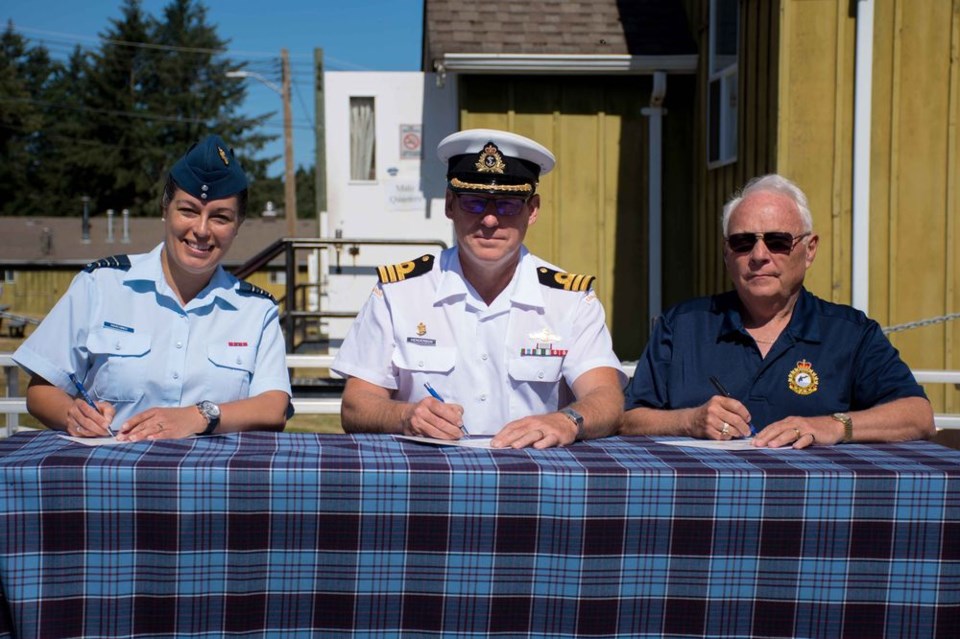Lt.-Col. (Lieutenant Colonel) Tami Marchinko took command of Albert Head Cadet Training Centre this summer, replacing Lt.-Col.(retired) Wayne Heal as the commanding officer (CO.) This is Marchinko’s second training centre CO appointment; she spent her last four summers commanding Cold Lake Cadet Training Centre in Cold Lake, Alta. This is her first summer at Albert Head Cadet Training Centre, Victoria, B.C., according to a release from the Albert Head Training Centre.
Growing up in Kamsack, Marchinko, (nee Bodnaryk ) joined 633 Kamsack Royal Canadian Air Cadet Squadron in 1984 and worked her way up through the ranks of the cadet program, retiring as a warrant officer first class in 1990. She attended Kamsack Comprehensive Institute.
Soon after her 19th birthday, she joined the Cadet Instructor List, now called Cadet Instructors Cadre, spending the majority of her subsequent summers working at Cold Lake Cadet Training Centre and the former Penhold Cadet Training Centre.
“Although Marchinko has dedicated her summers to working at cadet training centres, her commitment to the cadet program does not stop there,” said the release. “She has also shaped various aspects of the cadet program by serving on various Cadet Instructors Cadre writing boards and working groups as a subject matter expert, writer, or editor since 2003.”
Marchinko spent time either working or volunteering with five air cadet squadrons and one army cadet corps between 1990 and 2012, spending seven years with 703 Optimist Squadron in Regina and five years with 570 Sir Winston Churchill Squadron in Edmonton, Alta. In May of 2013 she was appointed as the Area Cadet Instructors Cadre Officer for Manitoba South and held the position until June 2016.
Marchinko currently resides in Portage La Prairie, Man. with her husband Jason, their two sons Greyson and Lochlan, and works as a substitute teacher between her time spent working with the cadet program.
Under Marchinko’s command this summer, approximately 900 cadets are participating in training that will improve their leadership, physical fitness, and good citizenship. As cadets complete their training they will be filled with a sense of accomplishment and bring their new skills back to their local units to share with their peers, it said.
Albert Head is a multi-faceted training facility which is attached to CFB Esquimalt, according to information found on the internet. From September to June each year, Albert Head is operated under the auspices of the Regional Cadet Instructor School (RCIS) (Pacific). As well as RCIS, various regular force, militia and cadet units use the training centre.
During the summer months, Albert Head is used as a cadet training centre (CTC). Albert Head is located approximately 30 kilometres southwest by road of downtown Victoria, bounded on three sides by the Strait of Juan de Fuca and occupies about 220 acres, 10 of which are developed as training facilities.
The site was first visited by Spanish explorers more than 200 years ago and, during the Second World War, "Fort Albert Head" played a major role as part of the coastal defenses. It housed the biggest guns this side of the country and commanded the approaches to both harbours as well as twenty miles out to sea, the information said.
Albert Head CTC was established in 1995 to further the leadership training provided by the air cadet program. Approximately 810 cadets will attend the summer training courses while a staff of approximately 150 will provide supervision and instruction.
The cadet program is open to all youth between the ages of 12 to 18 years with a focus on leadership, citizenship and healthy living and adult leaders are needed in Kamsack to help lead the program locally. If you are ready for the challenge, visit www.cadets.ca and click on “Find Us” and visit our Facebook page at www.facebook.com/cadetsca to see their adventures.



